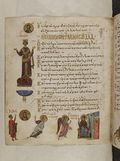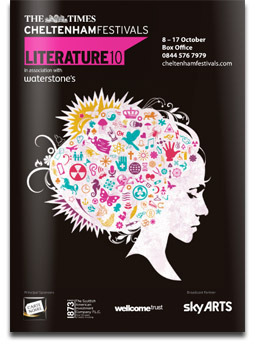Mary Beard's Blog, page 73
October 30, 2010
Bedding down in The Library

Earlier this week I took part in a debate at the British Library -- 'Is the Physical Library a Redundant Resource for 21st century academics' organised by THE. To put it another way, should we all stay at home/in our studies and call up all the resources we need on our lap tops and let the country save all the money that bricks and mortar and bulky things like books eat up. You can read an account of the debate here and here and here.
Now no-one could accuse The Don of being a Luddite (I have my laptop open in the breakfast table and cant imagine what life was like before JSTOR), but I don't intend to give up the physical library without a jolly good fight.
My paean of praise for the physical library included some of the familiar lines...You dont just go to the library for information, you go there to learn how to think differently, and that is about ordering, classification, serendipity (what book you find on the shelf next to the one you thought you were looking for...on which, see Grafton and Hamburger on the marvellous but threatened Warburg Library). And you go also for the people, the other readers and the librarians. And you go for the sheer pleasure of having space and quiet to THINK... not to mention the pleasures of transgression (and on this topic I had a little nostalgic reflection on all the things we used to do in libraries . . . eat, drink, smoke substances legal and illegal, have sex. I was tempted to ask for a show of hands from those who had ever made love in a library bookstack, a bibliophile's Mile High club, but thought embarrassment might produce a misleadingly low score.
In case any younger readers are puzzled, smoking used to be allowed in libraries a few years ago. Again a bit like on planes, the back two tables of the Cambridge Classics Library used to be the smoking tables, and the husband recalls how the Warburg went on allowing smoking well after other London libraries. Banning it would have caused a riot amongst its elderly Eastern European readers, but did -- he points out -- make the place a bit whiffy for everyone else. (Health and Safety gurus might like to reflect that none of these libraries burnt down!)
In some ways the most interesting area of disagreement between myself and the other panellists was in terms of speed and 'academic output'. There is little doubt that a lot of information can be more quickly retrieved electronically. Most of the other speakers treated this as an unproblematic good, and one went so far as to relate our embracing of new technology to the fact that UK academics produce more outputs per head than those of other nations.
At this point I felt very much in the opposite corner. The fact is that really good thinking is often a very SLOW process .. and it is the kind of process that goes on when you are waiting the thirty minutes that it takes for the book to arrive on you table, or on the 15 minute (for me) bike ride to the library. Indeed speed of information retrieval can actually work against good thinking. (Should we, I wondered, start a SLOW THINKING movement like slow cooking. . .?)
And as for congratulating ourselves on producing more than other nations . . . it's quality we want, not quantity. We probably should slow down a bit.
Anyway, by I nice coincidence I am now in New York for some meetings. And I am staying in The Library Hotel . . . a niche market, boutique hotel near New York Public Library -- and on a library theme. All the rooms are numbered according to the Dewey decimal system and are kitted out with books to match (I'm in Management 600.003 which isn't too much of a temptation, but the husband had philosophy a couple of weeks ago). And the picture at the top of this post is their "Do Not Disturb" notice.
A Library where eating, drinking, sleeping -- but not smoking, of course -- are all encouraged.
October 26, 2010
Who used to live in my house?

We are having some building work done -- to put in a shower, after 15 years with just a bath. The kids are pleased, but point out that we are installing this new technology just after they have 'left home".
Anyway in the course of demolishing the bathroom, the builders discovered that it had been lined with newspapers from 1958. Now, for all kinds of research reasons, I spend hours looking at old papers in the University Library, and am used very to looking at (and mining) old news stories -- but it means something quite different when the paper in question has been peeled from the interstices of your own bathroom.
Anyway the Cambridge Daily News, as it then was in 1958, is full of the celebrations of "Ceylon Independence Day" -- with a picture of the High Commissioner "amusing the company at the Bombay Restaurant, in the company of his two daughters. And there are the usual Cambridge flurry of bike thefts (including the arrest of some unfortunate nine-year-old on the said charge). Meanwhile the Sunday Times was praising the virtues of the New Years Honours List (Julian Huxley's Knighthood "can hardly appear premature"... and the same for Lord Nuffield's Companionship of Honour apparently).
But who was it who had the papers stuffed in to the wall?
Well, when we moved in to the house, we got all the previous paper deeds for the property (they were all going online, so the solicitors said we could have them). So it is clear enough that in 1958 the place was changing hands: the Librarian A. N. L Munby was selling it to Ursula Mary Thorne for £3900 (at a loss, as he had bought the place in 1948 for £4500, and I think had spent quite a bit on new bookcases). But who was doing up the bathroom... Munby to sell it, or Thorne in a make-over when she moved in? As the papers date from January and the sale was in late February, it looks like Munby was re-doing the bathroom to get a better price.
But who was Miss Thorne? I havent found much about her on the web, but she must be the Ursula Mary Thorne who was promoted in the WRNS on 27th November 1939. And I wonder if she was the same Ursula Thorne who died in July this year, aged 98, in Dorset.
Any leads? Do tell me.
(We are keeping the bath by the way, which is the 1880s original.)
October 22, 2010
The Cambridge University Diary goes multi-cultural
One of the things that we teach students about the early Roman empire is the impact of imperial rule on the Roman calendar. A traditional religious festival could become also the anniversary of the day on which one of Augustus' heirs assumed his adult toga, or whatever. And they were marked as such on the publically inscribed calendars.
The little changes in the inscribed texts offer a great resource for understanding big changes in Roman culture.
So what, I wonder, will the future historian make of what has been happening to the University Diary over the last few years. For those who aren't familiar with this, the University Diary is a little pocket calendar used largely by senior members of the university -- who like it because it marks the date of Faculty Board meetings, not to mention the beginnings and ends of term and so forth.
Anyway, a few years ago the poor old diary was resolutely Christian. In addition to the University meetings (and the birthdays of a few royals), it included all those little saints' days ..St Barnabas, St Edward King and Martyr and the rest. There was little practical point, but it paraded an old fashioned English Anglicanism of the established church.
Now it has suddenly become a cornocopia of religious diversity.
For many years, it has noted major Jewish festivals -- eg "Day of Atonement (Yom Kippur)". But in the last couple of years, it has become rather more embracing. Not just Judaeo-Christian. You can now find Islam (Ramadan), Hindu (Maha Shivarathri), Orthodox (Apostles Fast) and Sikh (Vaisakhi)... At first sight you would imagine that all religions were now equal, and that it would be Druidism next in our little diary.
But no. There is still a subtle set of distinctions betwen Anglican and other festivals. The Anglican feasts are noted either in capital letters or italics (I havent quite worked out what the difference is)...and they have no explanations. It's "St Swithun" or nothing, take him or leave him.
The other festivals go in the same type face as my own Faculty Board meetings and they carefully add a reference to what religion is concerned.. as in "Guru Nanak Birthday, Lunar (Sikh)". You are expected to know that St Tibb or CIRCUMCISION is UK Christian. In fact, up till a few years ago the diary assumed that its users knew that Yom Kippur was Jewish... now it writes "Jewish" in brackets.
So is this progress or not.
I am not sure, but I suspect that it will be progress when we get rid of the Duchess of Cornwall's birthday (same typeface as Ramadan), charming as she may be.
October 19, 2010
I get to own a Bugatti . . . kettle

I would never have normally spent such a lot on just a kettle. But two things coincided. First, the lid of our old faithful kettle finally bust -- and second it was the husband's birthday. As he rather likes gadgets, I wondered what a really hi-tech kettle might look like.
No sooner had I scanned the John Lewis website than I had fallen in love with the very very top of their range, a Bugatti Vera, for not much short of £200 (yes, but it was the conjugal birthday present remember -- as well as a replacement for the old one). It looked absolutely gorgeous and really not kettle-like at all. But I think I was partly struck by the idea of having a kettle made by the makers of the car I would never afford. It didnt take long to discover that the kettle makers have nothing to do with the cars (which are now made by Volkswagen anyway); but by then I was smitten.
Even when I read the decidely adverse on-line reviews from people who had had to send theirs back twice within the first six months, I was too much in love with the damn thing to waver. Even when the first few John Lewis outlets turned out not to have any in stock (they were being discontinued.. I wonder why), I persevered until the Oxford St branch had tracked one down at their distribution centre. And I wasn't even put off when the John Lewis lady couldnt help blurting out that it did seem quite expensive for a kettle (when John Lewis ladies do that, you know you are being a mug..).
Anyway, once I found it, it came within a day. And what did I get for my money?
Well all kinds of sophistications that I would never have thought possible for a kettle. You can choose what temperature to heat the water too (apparently some teas prefer 85 degrees rather than 100). ANd it doesnt just have a digital clock. You can programme it to boil your early morning coffee water ready for you. Why on earth you would want top do that I cannot possibly imagine, as it only takes a minute or so to boil anyway... but there you go.
And you don't just get an instruction manual (200 pages in 14 different languages), they also send along a CD to help you get started with your new machine. Yes: a CD to help you work a KETTLE, with firm warnings that Vera must only be used by adults "trained in her use". And there follow several minutes of a winsomely smiling girl demonstrating how to drive Vera, to the accompaniment of a patronisingly blokeish voice-over. Make sure your plug is earthed, he insists, "electrical products are sensitive to glitches in the electricity supply".. and in case you wonder why the lid doesn't open fully, don't worry "Bugatti has your safety at heart... we dont want any drops of water coming out and burning you . . . ' Then after being told to press the on/off switch ("just press on/off and Vera will heat up the water to the required temperature"), you're ready to go... "Vera by Bugatti -- elegance and innovation in the kitchen".
So how do I feel now? Well I still think that Vera is bloody beautiful and she boils a mean cup of water, just wonderfully; and the on'off sticker hasnt come off yet (like one of those dire online reviews threatened). But when we discover, as we soon shall, that people are losing their housing benefit in the government axe and the streets are full of the redundant, and of those who dont believe they can afford university, I think that Vera and her £185 quid's worth of sweetly flashing digital display may turn out to haunt me.
October 14, 2010
World-class universities vs the Human Resources Compliance Unit

Britain has a good number of world class universities, and many more than you would expect for its population and GDP. One of the things that KEEPS those universities world class is the exchange of lectures, seminars, examiners etc across the globe.
So, reflect on this: just recently a directive has come down to us from the "management" (as I have regretfully come to call the administration.. only 10 years ago they felt like my "colleagues"), explaining that in future we will only be allowed to appoint external examiners for PhDs from those who have a right to work in the UK (ie no Americans, Australians whatever). Apparently, so our "Human Resources Compliance Unit" (I am not joking) assures us, reading a PhD thesis, writing a report and giving the candidate a viva of (say) two hours counts as "employment". So if you are appointed to do this, you need to prove your eligibilty to work in this country, by showing your passport.
If this is correct (and I mean IF), then this is just one little blow to the idea of the UK as a home of world class scholarship.
In my Faculty, we normally use UK scholars to examine PhDs (we don't squander travelling expenses), but sometimes students have been researching subjects that really do require an non-EAA examiner. Tony Grafton of Princeton, for example, may be one of the very few people in the world properly qualified to examine a specialised PhD -- but he would no longer be appointable, at least on this interpretation of the law. And indeed it is lucky that the recently appointed "Australian" examiner, who has just taken on one of our theses, turned out to have a UK passport.
So what are our options? Well, HR seems to offer none (so much for being a world class university at the cutting edge of international research.... or should we now say "European" research). One idea in my neck of the woods is that we do it all by video link, so that the examiner doesn't have to come into the country (so much for those face to face exchange of views that make academic life worth living and top notch); another is that we fly the candidate and the external examiner to the US or Australia or wherever. Or maybe we just use the Channel Islands.
This is a just tiny example of new immigration madness. But the idea that the best students in Cambridge should not be examined by the best and most appropriate scholars in the world MUST make mockery of our clain to be one of the top universities on the planet (for that is what the international community of scholars is all about). And indeed why should reading a PhD thesis count as "employment" anyway? Could our HR department have actually got this wrong?
The next thing they will be telling us is that when we invite people to give our prestige endowed lectures, we will only be able to invite those with a right to work here.
This can't be what the immigration legislation intended. But, for what it is worth, any university which asks me to produce my passport before I accept the 100 quid for a minimum of 25 hours work examining a PhD thesis can BOG OFF.
October 12, 2010
The Cambridge Greek Play

I have a great affection for Greek drama, but I have to say that I prefer it either on paper in Greek, or performed on stage in English. I am not a huge fan of Greek tragedy performed in Greek.
The simple reason is that I don't understand enough of it. I was brought up to read Greek, and most spoken versions remain pretty incomprehensible to me, unless I have the Greek text on my knee. I remember going to see a performance of Aristophanes' Birds when I was in the sixth form, and the only line I caught in the whole damn play was spoken by Iris... 'all' athanatos eimi' ('but I'm immortal') she grinned at a crucial point, winsomely enough. It didn't take me too long to see that I would have got more out of just curling up in an armchair and reading the text. Since 1974, I have resolutely eschewed Greek drama performed in Greek.
Anyway, this puts me in a tricky position every three years when it comes to the triennial Cambridge Greek play (whose 1974 Medea was the last performance I saw).
This venerable Cambridge institution goes back to 1882, since when the university has staged a play in the original Greek pretty much every three years, a bit more irregularly in its early days. It was the first successful venture of this kind,and more or less since antiquity itself. The original idea was not actually to enjoy the brilliance of Greek literature. It was put on with a much more archaeological aim in view -- to explore how Greek tragedy could be re-enacted in the physical context of a theatre, and to recreate costumes, settings and authentic props. The literature came second.
In the early years, it was a huge society event. There were special trains put on from London, and the great and the good flocked to Cambridge to see the likes of the wonderfully attractive Rupert Brooke play the second guard from the left (apart from a starring role for Janet Case, Virginia Woolf's Greek teacher, in 1883, there was not a women in the cast till 1950); the music was specially composed by the likes of Vaughan Williams. It is still a semi-professional production, rather than a bit of student am. drama.
Anyway, this year the Greek play is the Agamemnon. And, for no particularly good reason (they have useful surtitles now, I'm told), I am keeping up my record of non attendance...from bloody minded-ness more than anything else. (Sorry James -- the charming invitation nearly worked, but I do have my record to sustain).
But they do say it is really very good this year, and most people dont feel like me about spoken Greek; I am told there are still a few matinee tickets left. So go for it, and report back!
October 10, 2010
How to read a Latin poem, the ancient Booker -- and other Cheltenham events
I have just got back from the Cheltenham Literature Festival -- and from the start of the Classics "strand" which worked better than I could ever have hoped (there is still a "heroines" debate next week, if you are near Cheltenham and up for some high-fibre entertainment). I've already trailed this, so apologies for any repetition... but it has now actually happened.
First off, on Saturday, was that discussion I mentioned between Kevin MacDonald and Maria Wyke about the forthcoming movie, Eagle - based on the Rosemary Sutcliff novel. This went really well, I thought, because both Maria and Kevin were prepared to play and engage with the audience -- and in Kevin's case to talk frankly about how he had changed the original story and why (like the relationship between Marcus and Esca becoming less deferential and more edgy, and the virtual disappearance from the movie of Cottia -- the only possible heterosexual love interest in the original book). For me this was an eye opener onto adapting a book for the screen. (No less fascinating was people's recollection of old BBC versions on both radio and tv, which had stuck in their memory more firmly, I think, than the book itself.)
Saturday evening turned out to be a big prequel to an even bigger day on Sunday -- with two classical events. The first was the high risk discussion of two Latin poems, Catullus and Horace. I guess this is what I am most proud of -- because it would have been so easy to get it wrong (and dull). But we managed to go through the poems in such a way that I felt I saw more in them than I ever had before, and honestly I thought we had 250 people really gripped. So thank you Llew and Peter.
And finally, as some of you who could not be there have asked me to post, who won the ancient Booker prize?
There were four runners: Juvenal's Satires (pitched by Lindsey Davis), Sappho (and especially "phainetai moi") pitched by Germaine Greer, Euripides' Medea (pitched by Natalie Haynes) and Statius' Silvae (pitched by Peter Stothard). And the truth is that all gathered a very respectable clutch of votes -- but Medea emerged the winner.
The turning point came when Natalie read out a key speech of Medea and the stony hearts of the audience were melted... and continued to be so, despite the clever assault from Michael Bywater from the floor, pointing out that in 431 the play had come last in the tragic competition, so why give it the Booker now? Natalie's line was that its time had, at last, come.
Honesty, I couldnt have predicted the winner. Germaine was typically Germaine-like in enthusing about Sappho; Lindsey had a great line on Juvenal as wit and moralist; Peter puffed Statius as exactly the type of poet who really would have won the ancient prize (difficult, avant garde and innovative?).
Whatever the final order of prizes, I think we probably encouraged more people to read each of these nominees. Which was largely the point.
October 8, 2010
The Eagle of the Ninth
Tomorrow I am off to the Cheltenham Literary Festival, to do the series of gigs as Guest Director there.
The first event, on Saturday afternoon, is a session of discussion with Kevin (Last King of Scotland) Macdonald and Maria Wyke on Roman movies. The prompt for this is KM's forthcoming film, The Eagle, which adapts Rosemary Sutcliff's The Eagle of the Ninth for the big screen. I read this book (or, I think, had it read to me) when I was a small child.. and remember the story of the lost ninth legion, and the quest of Marcus to find out what happened to his lost dad (is that right?) with huge warmth, though haven't been back to it since.
So I have bought a new copy to read on the way there. The text is still a bit of a closed, or slightly ill-remembered, book. But I have skimmed through and the pictures are just the same as I recall, including the dreamy wood-cut of Marcus as the frontispiece.
The idea will be to link the forthcoming film to the whole tradition of Romans on film that Maria knows about... back to Spartacus and beyond.
Anyway, after that there are other events in my strand that I have plugged before: the Ancient Booker prize debate (with some no more curious offerings on the shortlist than in a modern Booker), and the How to Read a Latin Poem slot...
This is the high risk, exciting new-style literary festival offering. Llewelyn Morgan and myself, actively chaired by Peter Stothard, will be doing a 'master class' on Catullus 85 and Horace Odes 1, 7 (the Plancus Ode).
I dont think that there has been another lit festival in the UK that has ever featured Latin in Latin....and, as if to celebrate, we shall be having the Latin original of those poems up on digital traffic signs in Cheltenham, not to confuse motorists but to amuse and entice festival goers.
And that's my whole weekend. Back to Cambridge on Sunday night.
October 6, 2010
Do we want Simon Schama as History Czar

Declaration of interest: I dont know Prof Schama well, but what I know I like a lot. He is smart, clever, engaging and not -- so far as I have any experience -- remotely ill-willed. A great cook, a great dinner companion, a wonderful writer and an acute historian.
True. But do we want him advising Mr Gove on the History Curriculum in British schools?
I think not. Actually, what we really need is a group of intelligent British school teachers, calling on all kinds of historical talent outside school, wherever it may be found.
So what's wrong with Schama?
Well, this is celebrity culture at its most meretricious -- Gove playing to the populist gallery. The fact that Schama is smart and has made some good television programmes does not mean that he is the best person (if reports are right) to head up the new drive to revitalise British history.
Schama long ago decided to make his (day job) career in the United States -- which gives him maybe a usefully external perspective on the British system, but also means that he is necessarily out of touch with the stresses, strains and demands of what is going on in British schools right now. That makes him an excellent person to consult, but not to head up the new policy.
The same would go for Niall Ferguson (another Tory brainwave for putting some energy into school History).. and the same would go, in Classics, for Mary Beard (though I do at least work here). She certainly ought to be consulted about the direction of Latin teaching in schools, but only as part of a wide team. We dont want MB guiding what happens to Classics in this country any more than we want Schama or Ferguson doing that for History. That is because there are many good History/Classics teachers who would be much better at tackling this job.
My suspicion though is that this is not simply celebrity culture, it is also penny pinching. I dont know how much Prof S is getting paid, if at all (and for his sake I hope he has a nice fee). But whatever it is, I am sure that it is less than what it would cost to bring 15 History teachers, plus a few outside "experts", together for a couple of days... costing up the travel, board and lodging, etc.
Prof Schama is not only glitzy, but also cheap. And appointing him to whatever "job" he now has is also an insult to History teachers here.
October 3, 2010
I test-drive Google Latin -- and some other new electronics
Our computer officer (thanks Steve) alerted me to the new addition to Googles repertoire of electronic translation aids: the Latin translator. You type the Latin words in they give you the English words out.
Wondering whether it might put me out of a job (no, not seriously..), I decided to give it a test drive.
Let me say, before I get the knives out, that part of me is full of admiration for the people who do this. I would have no idea how to start making a computer translating programme. I'm sure it's very hard -- and that many exciting innovations have teething troubles.
But with that out of the way, the verdict is -- dont touch it with a barge pole.
My first shot was actually quite encouraging. I typed in "arma virumque cano" and "I sing of arms and the man" came out. I have come to suspect that someone had actually specially entered a range of obvious quotes people might search for, with a correct translation -- because Google was unexpectedly good at these ("per ardua ad astra" = "up the steep slope to the stars" etc). Now that may be useful enough in its was, but it isnt what I call "translation"; it's a database of quotes.
Things started to go wrong pretty quickly when I typed in some baby Latin. "Servus est in villa" (and you couldnt get much simpler than that) comes out as "In the town is the servant of" (how come villa = town? and where has the "of" appeared from?).
More complicated bits of Latin literature fared just as badly (if they hadnt been entered as a "quote", there was not a hope). Try the start of Tacitus' Annals:
"urbem romam a principio reges habuere; libertatem et consulatum L Brutus instituit"
That emerges as:
"the city of Rome from the beginning they had been the kings of the liberty of the consulship, and instituted the Brutus, 50"
What do these people have with "of"? And even if you change L to Lucius, you still get:
"the city of Rome from the beginning they had been the kings of the liberty of the consulship, and instituted the base of Lucius Brutus"
Where has base appeared from? And why is he now in the genitive?
My final attempt was with the start of Horace Odes 1, 7 (the Plancus Ode-- which Peter, Llewelyn and I will be discussing in Cheltenham at the Literary Festival next week):
"Laudabunt alii claram Rhodon aut Mytilenen
aut Ephesum bimarisue Corinthi
moenia. . . "
This came out as:
"Others sing in praise of Rhodes, or a clear to Mitylene
bimarisue to Ephesus, or Corinth,
the walls of . . "
So they dont know the future tense either....laudabunt??
To be fair, the site does give you the chance of contributing a better translation. So if enough Latinate mugs do so, the database might get big enough to be more helpful. But until they have taught this computer so basic Latin grammar, it will be an uphill struggle.
Rather more useful (though I am not absolutely sure for what) is Google maps, street view of Pompeii. 
But for the real Rolls Royce of IT (and without doubt a real service to scholarship), go to the British Library's website, where they have put almost 300 of their Greek manuscripts on-line. with full bibliography and description -- and you can zoom in and really look closely at the text, all for free. The project was funded by the Niarchos foundation, to whom we should be truly grateful. You can find an overview here, with a well-deserved puff from me.
Mary Beard's Blog
- Mary Beard's profile
- 4110 followers







